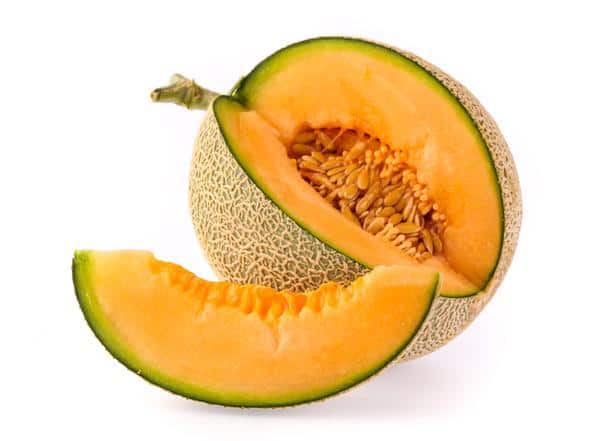Summer is here, where everybody wants to eat cantaloupe or even taste slices of it. Most people would love to enjoy it raw while some would rather consume it into a melon shake. One thing I like when enjoying swimming and a walk in the park is a summer fruit. It helps me to finish off my delicious, yet a great meal. After long hours of fun, sinking into honeydew, watermelon or cantaloupe slices is my favorite because this is the prettiest way to cool down my nerves.
Did you know that dogs eat numerous food which human being eats too? Of course, yes. You’ll find a dog looking at you as you eat cantaloupe and would even want a slice as well. Having this in mind it can be difficult and tricky to know which fruit is suitable for your dog.

Can Dogs Eat Cantaloupe?
As a pet owner, you should think whether cantaloupe is suitable for your canine companion to eat. My short answer to this red-hot question is yes, cantaloupe is an amazing source of vitamin B6, dietary fiber, folate, niacin, Vitamin C, potassium and Vitamin A. All these things are very important to your dog as they are to you, especially, as your dog becomes senior. Also, the fruit is high in water content and low in calories, making it not only a tasty but also a superb way to rehydrate without even packing on the pounds.
Micronutrients Packed with Cantaloupe and Their Benefits to Dogs
As we know, both vegetables and fruits like pears are excellent sources of minerals and vitamins. That is what precisely cantaloupe brings to the table. With this, we can say that this fruit is vital for pups and can provide a healthy alternative to threats. Apart from it being 90 percent water, cantaloupe can act as water to pets who are not keen on drinking water. Let us look at these micronutrients in detail.
Beta-carotene
This is a precursor of Vitamin A. It is a reputable and amazing antioxidant that has various benefits when it comes to management and prevention of inflammatory conditions. As a paramount precursor molecule for Vitamin A, Beta-carotene also plays a greater role in the development and growth of healthy skin together with a shiny and healthy coat. Additionally, it assists in normal bone development. Because of this, highly active dogs will benefit when it comes to bone development and healthy skin. Besides this, beta-carotene also plays a pivotal role in the prevention of particular canine cancers.
Vitamin A
This is another micronutrient that is associated with cantaloupe. Raw cantaloupe is essential for this. A hundred gram of cantaloupe can easily offer you approximately 170 micrograms of strong Vitamin A. This nutrient is astounding for good eyesight. If your dog takes this it regularly, he can improve in terms of eye sensitivity. Consequently, it offers a great effect in minimizing the dangers of developing muscular generations among senior dogs. In conjunction with Vitamin C, this incredible antioxidant really boosts your pet’s ability to fight off infections.
Potassium
Potassium is well-known to be among the most essential minerals. Being an important component of cellular functioning, potassium interplays with sodium to help facilitate the transmission of amazing electrical impulses. In turn, this helps in the contraction and relaxation of muscles. In simple terms, it is significant in optimum muscular system integrity and neurologic functioning. Imagine your dog’s brain failing to communicate with other vital body organs just because of a lack of potassium ions. Let your dog eat a piece of cantaloupe. He will stay active always.
Vitamin C
Some people have no idea that cantaloupes are reliable sources of Vitamin C. Arguably, hundreds of grams of fresh cantaloupe contain about 37 milligrams of ascorbic acid. The acid is beneficial among pets when it comes to the development of bones and skin. Dogs that suffer from joint problems will find it as the answer to their problems as this acid promotes the increased synthesis of collagen. Furthermore, this protein is exceptional in various connective tissues, including cartilage and bone. Just fight canine arthritis, joint and articular problems with Vitamin C from cantaloupes.
Are Cantaloupes Safe for Dogs?
Yes, cantaloupe is usually safe for dogs to eat. It is not toxic or poisonous in any way. To add to that, it’s among the healthiest fruits your dog can have. Nevertheless, there are various things to consider when giving this fruit to your dog. First, don’t provide your pet with large amounts of cantaloupe. This is because most dogs will experience stoma ache, and some will have a loose-tool.
Conclusion
To wrap it up, cantaloupe is perfect for dogs to eat. It’s even safe, efficient and quite healthy for your pets. Thanks to its potassium, Vitamin C, Vitamin A, beta-carotene among others. Also, it’s rich in anti-inflammatory components and antioxidants. Both small and senior dogs will benefit. Remember to give the necessary amounts to save your dog from stomach ache and a loose-stool. I think that all things are in moderation now.
